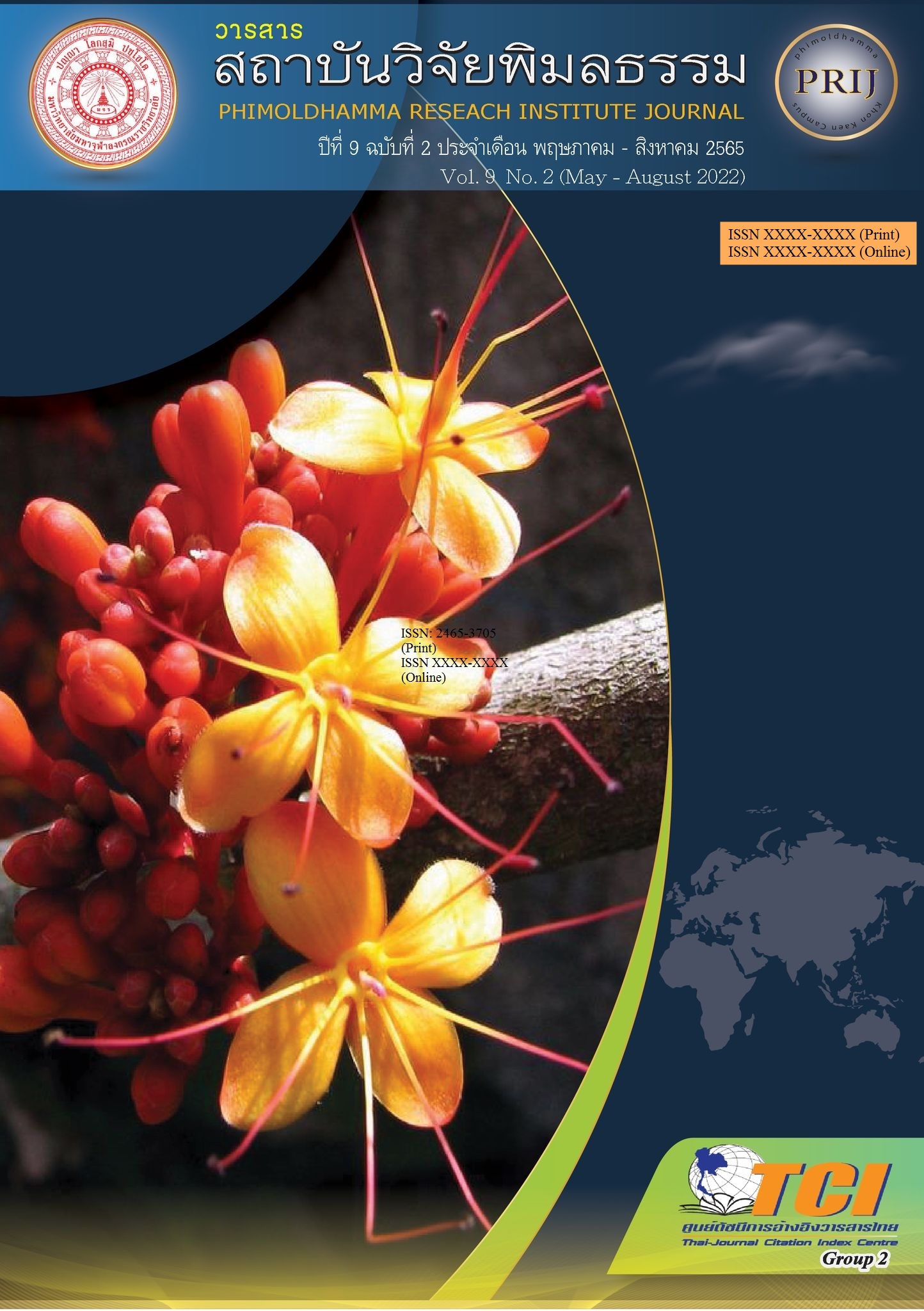ผลของโปรแกรมพุทธสุนทรียสนทนาต่อความสามารถในการเรียนรู้แบบนำ ตนเองของนิสิตมหาวิทยาลัยมหาจุฬาลงกรณราชวิทยาลัย จังหวัดกาญจนบุรี
คำสำคัญ:
สุนทรียสนทนา, โปรแกรมพุทธสุนทรียสนทนา, การเรียนรู้แบบนำตนเองบทคัดย่อ
การวิจัยครั้งนี้ มีวัตถุประสงค์เพื่อ 1) ศึกษาแนวคิดสุนทรียสนทนาร่วมกับหลักธรรมทางพระพุทธศาสนาและความสามารถในการเรียนรู้แบบนำตนเอง 2) พัฒนาโปรแกรมพุทธสุนทรียสนทนา และ 3)ศึกษาผลของโปรแกรมพุทธสุนทรียสนทนาต่อความสามารถในการเรียนรู้แบบนำตนเองของนิสิตมหาวิทยาลัยมหาจุฬาลงกรณราชวิทยาลัย จังหวัดกาญจนบุรี เป็นการวิจัยกึ่งทดลอง เครื่องมือที่ใช้คือ โปรแกรมพุทธสุนทรียสนทนาที่พัฒนาความสามารถในการเรียนรู้แบบนำตนเอง และแบบสอบถามความสามารถในการเรียนรู้แบบนำตนเอง ค่าความเชื่อมั่นที่ 0.983 กลุ่มตัวอย่าง ได้แก่ นิสิตสาขาพระพุทธศาสนาชั้นปีที่ 2 จำนวน 40 รูป/คน แบ่งเป็นกลุ่มทดลองและกลุ่มควบคุม กลุ่มละ 20 รูป/คน วิเคราะห์ข้อมูลเปรียบเทียบภายในกลุ่มโดยใช้สถิติ Pairedt- test เปรียบเทียบระหว่างกลุ่มโดยใช้สถิติ Independent t- test
ผลการวิจัยพบว่า
1. แนวคิดสุนทรียสนทนาร่วมกับหลักธรรมทางพระพุทธศาสนาและความสามารถในการเรียนรู้แบบนำตนเอง พบว่า แนวคิดนี้ทำให้นิสิตเกิดการฟังอย่างมีสติ ฟังด้วยโยนิโสมนสิการ ไม่ตัดสินผู้อื่น
ใช้วิธีการพูดที่เกิดประโยชน์ มาใช้ในการเรียนรู้แบบนำตนเอง ซึ่งเน้นตัวผู้เรียนให้วางแผนในการเรียนรู้ ประเมินการเรียนรู้ด้วยตัวเอง ทำให้เกิดประโยชน์แก่ผู้เรียน และช่วยแก้ปัญหาในการเรียนรู้ ส่งผลให้ความสามารถในการเรียนรู้แบบนำตนเองของผู้เรียนสูงขึ้น
2. การพัฒนาโปรแกรมพุทธสุนทรียสนทนา พบว่า โปรแกรม ประกอบด้วย 4 ขั้นตอน แบ่งเป็นกิจกรรมย่อย 7 กิจกรรม ได้แก่ 1) พุทธกัลยาณมิตตตา 2) พุทธปุจฉา 3) พุทธสติ 4) พุทธสัมปชัญญะ
5) พุทธสนทนา 6) พุทธสนทนา 7) พุทธวิสัชนา
3. ผลของโปรแกรมพุทธสุนทรียสนทนาต่อความสามารถในการเรียนรู้แบบนำตนเองของนิสิต มหาวิทยาลัยมหาจุฬาลงกรณราชวิทยาลัย จังหวัดกาญจนบุรี พบว่า หลังการทดลอง กลุ่มทดลองมีคะแนนเฉลี่ยการเรียนรู้นำตนเองตามแนวพุทธจิตวิทยาเพิ่มมากขึ้นกว่ากลุ่มควบคุมอย่างมีนัยสำคัญทางสถิติที่ระดับ .05
เอกสารอ้างอิง
ชญาน์นันท์ อัศวธรรมานนท์ และประทีป พืชทองหลาง. (2561). การสื่อสารธรรมเพื่อการพัฒนาสังคมเชิงสร้างสรรค์. วารสารสันติศึกษาปริทรรศน์ มจร, 6(ฉบับพิเศษ), 268-271.
พระมหาพิษณุ สญฺญเมโธ, พระศรีสิทธิมุนี และวีรกาญจน์ กนกกมเลศ. (2563). สุนทรียสนทนาในพระพุทธศาสนากับสุนทรียสนทนาเชิงสร้างสรรค์ในสังคมไทย. วารสารวิชาการ มจร บุรีรัมย์, 5(2), 249-261.
พระมหาสุเทพ สุทฺธิญาโณ (ธนิกกุล). (2561). โปรแกรมพัฒนาสมรรถนะการปรึกษาแนวพุทธจิตวิทยาของพระสงฆ์ด้านการเยียวยาจิตใจผู้ป่วย. (วิทยานิพนธ์พุทธศาสตรดุษฎีบัณฑิต). พระนครศรีอยุธยา: มหาวิทยาลัยมหาจุฬาลงกรณราชวิทยาลัย.
ล้วน สายยศ และอังคณา สายยศ. (2538). เทคนิคการวิจัยทางการศึกษา. (พิมพ์ครั้งที่ 5). กรุงเทพฯ: สุวีริยาสาส์น.
สุภัทรา ภักดีศรี. (2555). การพัฒนาโปรแกรมการเสริมสร้างแรงจูงใจในการปฏิบัติงานด้วย สุนทรียสนทนาสำหรับพยาบาลวิชาชีพ โรงพยาบาลชนแดน จังหวัดเพชรบูรณ์. (วิทยานิพนธ์พยาบาลศาสตรมหาบัณฑิต). กรุงเทพฯ: มหาวิทยาลัยสุโขทัยธรรมาธิราช.
สุมน อมรวิวัฒน์. (2542). การพัฒนาการเรียนรู้ตามแนวพุทธศาสตร์ทักษะกระบวนการเผชิญสถานการณ์. นนทบุรี: มหาวิทยาลัยสุโขทัยธรรมาธิราช.
แสงเดือน เจริญฉิม และคณะ. (2555). ความสามารถในการเรียนรู้แบบนำตนเองของนิสิตฝึกประสบการณ์วิชาชีพครูคณะศึกษาศาสตร์และพัฒนศาสตร์ มหาวิทยาลัยเกษตรศาสตร์. (รายงานการวิจัย). กรุงเทพฯ: มหาวิทยาลัยเกษตรศาสตร์.
โสฬส ศิริไสย์. (2549). Dialogue มิติใหม่ของเวทีชาวบ้าน. วารสารภาษาและวัฒนธรรม, 25(2), 38-49.






